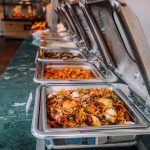
On June 29, we had an interview on the Degustar España program on Radio Nacional de España. A very interesting program that we recommend you listen to if you want to discover and learn more about Spanish gastronomy. If you want to listen to the entire program you can do it from here.
If you just want to listen to our interview, you can do so by playing the audio above or you can also read it below.
Interviewer. In a world that tends towards standardization, we are happy to find companies that work preserving the most authentic flavors, as authentic are the flavors of game. At the moment, there is no room for substitutes in this gastronomic world, and in the Jaén town of Aldeaquemada, in the heart of the Sierra Morena, we find the Artemonte company and Ricardo de Guindos, who is the Managing Director of Artemonte, is in charge of it. What’s up, Richard? How are you?
Artemonte. Hello. Very good days. Well, very good.
Interviewer. We caught you in the company because you move around a lot, maybe you’re at the Gourmet Show, you’re in Europe or you’re out there, well, searching a lot for your market. Are you in the company right now?
Artemonte. Right now I am here. The call in the best environment.
Interviewer. Fine. I say that here in this type of products with which you work here there is no cheating or cardboard; that is to say, the flavors of the game, at the moment, cannot be imitated, right?
Artemonte. Effectively. One of the advantages that game meat has, one of the points that we most try to defend and give value to ourselves is the feeding of the animals. The animals are raised in complete freedom, it is a completely wild diet, they feed on the material that they best find in the field, and the truth is that, in the end, this translates into a flavor to the meat and some characteristics and qualities of meat that are difficult to obtain or to imitate with a management that is, let’s say, of supply or with a management, let’s say, on farms.
Interviewer. Well then, let’s get down to business. What meats do you work?
Artemonte. Well, we are specialized in working with deer, fallow deer and wild boar meat, at the level of big game. Then, we also work a lot with small game, especially birds, where partridge, duck and pheasant stand out above all. Those would be the main meats with which we make products.
Interviewer. And Jaén, moreover, is a paradise for hunting, not only Sierra Morena, but also, obviously. I imagine that all your raw material comes from the environment, right?
Artemonte. Effectively. A very important part, a very high percentage of all our production comes from animals from here, from the Province of Jaén, and that are probably unknown to the province, because people do not know the large number of animals of these species. here in the province
Interviewer. Of course, hunting has its seasonality and what you are doing, apart from the fact that you also have fresh meat, which we can comment on, but your main business in some way, or your origin, is precisely breaking that seasonality. That is, to preserve and offer processed meat so that it can be consumed at any time of the year.
Artemonte. The truth yes. When we started with this project, one of the problems that we realized that we had was the seasonality of consumption, not only of the meats, but also of the products that we made with these meats. So, well, little by little, what we have been evolving in is manufacturing or developing other types of products that manage to break that seasonality. For example, right now the summer season is coming, the hot season, well, we are beginning to produce more products for barbecues, which we can make from hamburgers, skewers, steaks, all aimed at being able to work them. in barbecues or in slightly more summery environments. We have also released, for example, products oriented towards salads, such as pickled shredded, partridge shredded, pheasant shredded. Well, a bit with the natural intention of breaking with seasonality, and at the same time, being able to help the hotel industry or final consumers to present slightly different seasonal dishes, because the truth is, since there is so little custom on these dates to work this type of meat, because, in the end, it becomes something exotic and exclusive when it is presented.
Interviewer. How exotic and exclusive is, for example, the duck salami, which is one of your star products, I think, right?
Artemonte. Yes. We practically have to say that of all the sausages we make, it is true that there are some for which you can find some competition, but they are all very exclusive products.
I vos. Some of them are indeed products, such as duck salami or wild boar loin, which did not exist on the market when we launched them, and the truth, well, is that there is a great lack of knowledge and people are surprised. Thank God, they are pleasantly surprised, both when they try them and when they get to know them at the image level. So, we are very happy with that and, in the end, what we try to look for and achieve is to give it that touch of difference and added value that products made from these materials have.
Interviewer. And then, the conservation processes you have also noticed what has been done in a lifetime. For example, the typical conservation in the daggerboard with oil. That has been done forever, I think.
Artemonte. Effectively. One of the points that we, when we have started to work and make products with these meats, well, really, they are exotic and they are exclusive now, because they are still meats that traditionally have been worked a lot, especially in these rural areas of the Province of Jaén, and well in the end, in many of the products that we produce what we try to do is recover those traditions and recover a little those ways that they had, for example, of preserving meat in the past. So, we continue along this line, and what we do, for example, is canning following the same processes that were followed in the past, but, well, adapting them a little to the requirements and the current market. We continue making canned daggerboards the same way they were done before, we adapt them to certain formats and to the technical processes that are necessary in these times, but, really, the base is the traditional process that has always been applied.
Interviewer. I said at the beginning that we live in a world that tends towards standardization and also, in a world where, I think, flavors are being lost. For example, there are people who think game meat has a strong flavor because we are not used to seeing that authenticity and it seems that, as you said before, well, perhaps the cooks have that responsibility, as has happened with the offal of put back on the table, never better said, these flavors that are truly inimitable. The restoration there has a lot to say.
Artemonte. There are many things about game meat that can also be considered a bit of a myth: it is a meat that has a particular differential flavor, a strong flavor in some cases, but it is a meat that is well worked and following the correct processes that must be followed. With these meats, it is possible to achieve that they have a differential value and a differential flavor without it being a strong flavor that produces rejection in any type of consumer. Probably the problem, more than the taste of these meats itself, is the lack of knowledge of how they should be worked.
Interviewer. Wild boar, roe deer, partridge, deer can be found in preserves, in pates, in sausages, also hamburgers, on skewers; Artemonte is dedicated to all this. This is the name of this company that is in Aldeaquemada, in Jaén, in the middle of the Sierra Morena, and Ricardo de Guindos, who is its CEO, has told us about it. Thank you very much, Ricardo, for serving us.
Artemonte. Thank you very much for giving me the opportunity and to see if we can encourage everyone to try this type of product and meat.
Interviewer. Let’s see if it’s true.



